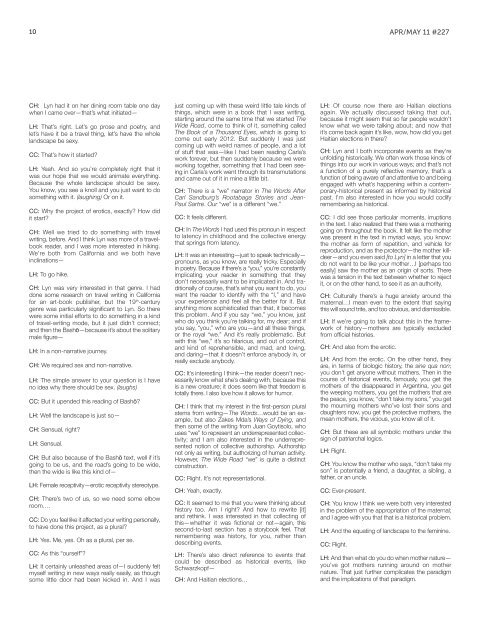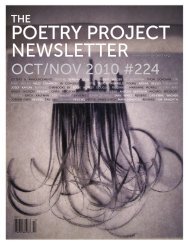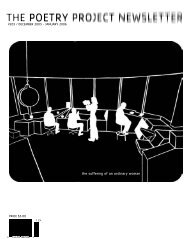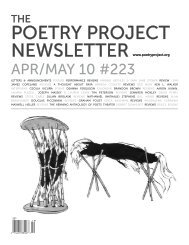You also want an ePaper? Increase the reach of your titles
YUMPU automatically turns print PDFs into web optimized ePapers that Google loves.
10 APR/MAY 11 #227CH: Lyn had it on her dining room table one daywhen I came over—that’s what initiated—LH: That’s right. Let’s go prose and poetry, andlet’s have it be a travel thing, let’s have the wholelandscape be sexy.CC: That’s how it started?LH: Yeah. And so you’re completely right that itwas our hope that we would animate everything.Because the whole landscape should be sexy.You know, you see a knoll and you just want to dosomething with it. (laughing) Or on it.CC: Why the project of erotics, exactly? How didit start?CH: Well we tried to do something with travelwriting, before. And I think Lyn was more of a travelbookreader, and I was more interested in hiking.We’re both from California and we both haveinclinations—LH: To go hike.CH: Lyn was very interested in that genre. I haddone some research on travel writing in Californiafor an art-book publisher, but the 19 th -centurygenre was particularly significant to Lyn. So therewere some initial efforts to do something in a kindof travel-writing mode, but it just didn’t connect;and then the Bashō—because it’s about the solitarymale figure—LH: In a non-narrative journey.CH: We required sex and non-narrative.LH: <strong>The</strong> simple answer to your question is I haveno idea why there should be sex. (laughs)CC: But it upended this reading of Bashō?LH: Well the landscape is just so—CH: Sensual, right?LH: Sensual.CH: But also because of the Bashō text, well if it’sgoing to be us, and the road’s going to be wide,then the wide is like this kind of—LH: Female receptivity—erotic receptivity stereotype.CH: <strong>The</strong>re’s two of us, so we need some elbowroom….CC: Do you feel like it affected your writing personally,to have done this project, as a plural?LH: Yes. Me, yes. Oh as a plural, per se.CC: As this “ourself”?LH: It certainly unleashed areas of—I suddenly feltmyself writing in new ways really easily, as thoughsome little door had been kicked in. And I wasjust coming up with these weird little tale kinds ofthings, which were in a book that I was writing,starting around the same time that we started <strong>The</strong>Wide Road, come to think of it, something called<strong>The</strong> Book of a Thousand Eyes, which is going tocome out early 2012. But suddenly I was justcoming up with weird names of people, and a lotof stuff that was—like I had been reading Carla’swork forever, but then suddenly because we wereworking together, something that I had been seeingin Carla’s work went through its transmutationsand came out of it in mine a little bit.CH: <strong>The</strong>re is a “we” narrator in <strong>The</strong> Words AfterCarl Sandburg’s Rootabaga Stories and Jean-Paul Sartre. Our “we” is a different “we.”CC: It feels different.CH: In <strong>The</strong> Words I had used this pronoun in respectto latency in childhood and the collective energythat springs from latency.LH: It was an interesting—just to speak technically—pronouns, as you know, are really tricky. Especiallyin poetry. Because if there’s a “you,” you’re constantlyimplicating your reader in something that theydon’t necessarily want to be implicated in. And traditionallyof course, that’s what you want to do, youwant the reader to identify with the “I,” and haveyour experience and feel all the better for it. Butanything more sophisticated than that, it becomesthis problem. And if you say “we,” you know, justwho do you think you’re talking for, my dear; and ifyou say, “you,” who are you—and all these things,or the royal “we.” And it’s really problematic. Butwith this “we,” it’s so hilarious, and out of control,and kind of reprehensible, and mad, and loving,and daring—that it doesn’t enforce anybody in, orreally exclude anybody.CC: It’s interesting I think—the reader doesn’t necessarilyknow what she’s dealing with, because thisis a new creature; it does seem like that freedom istotally there. I also love how it allows for humor.CH: I think that my interest in the first-person pluralstems from writing—<strong>The</strong> Words…would be an example,but also Zakes Mda’s Ways of Dying, andthen some of the writing from Juan Goytisolo, whouses “we” to represent an underrepresented collectivity;and I am also interested in the underrepresentednotion of collective authorship. Authorshipnot only as writing, but authorizing of human activity.However, <strong>The</strong> Wide Road “we” is quite a distinctconstruction.CC: Right. It’s not representational.CH: Yeah, exactly.CC: It seemed to me that you were thinking abouthistory too. Am I right? And how to rewrite [it]and rethink. I was interested in that collecting ofthis—whether it was fictional or not—again, thissecond-to-last section has a storybook feel. Thatremembering was history, for you, rather thandescribing events.LH: <strong>The</strong>re’s also direct reference to events thatcould be described as historical events, likeSchwarzkopf—CH: And Haitian elections…LH: Of course now there are Haitian electionsagain. We actually discussed taking that out,because it might seem that so far people wouldn’tknow what we were talking about; and now thatit’s come back again it’s like, wow, how did you getHaitian elections in there?CH: Lyn and I both incorporate events as they’reunfolding historically. We often work those kinds ofthings into our work in various ways; and that’s nota function of a purely reflective memory, that’s afunction of being aware of and attentive to and beingengaged with what’s happening within a contemporary-historicalpresent as informed by historicalpast. I’m also interested in how you would codifyremembering as historical.CC: I did see those particular moments, irruptionsin the text. I also realized that there was a motheringgoing on throughout the book. It felt like the motherwas present in the text in myriad ways, you know:the mother as form of repetition, and vehicle forreproduction, and as the protector—the mother killdeer—andyou even said [to Lyn] in a letter that youdo not want to be like your mother…I [perhaps tooeasily] saw the mother as an origin of sorts. <strong>The</strong>rewas a tension in the text between whether to rejectit, or on the other hand, to see it as an authority.CH: Culturally there’s a huge anxiety around thematernal…I mean even to the extent that sayingthis will sound trite, and too obvious, and dismissible.LH: If we’re going to talk about this in the frameworkof history—mothers are typically excludedfrom official histories.CH: And also from the erotic.LH: And from the erotic. On the other hand, theyare, in terms of biologic history, the sine qua non;you don’t get anyone without mothers. <strong>The</strong>n in thecourse of historical events, famously, you get themothers of the disappeared in Argentina, you getthe weeping mothers, you get the mothers that arethe peace, you know, “don’t take my sons,” you getthe mourning mothers who’ve lost their sons anddaughters now, you get the protective mothers, themean mothers, the vicious, you know all of it.CH: But these are all symbolic mothers under thesign of patriarchal logics.LH: Right.CH: You know the mother who says, “don’t take myson” is potentially a friend, a daughter, a sibling, afather, or an uncle.CC: Ever-present.CH: You know I think we were both very interestedin the problem of the appropriation of the maternal;and I agree with you that that is a historical problem.LH: And the equating of landscape to the feminine.CC: Right.LH: And then what do you do when mother nature—you’ve got mothers running around on mothernature. That just further complicates the paradigmand the implications of that paradigm.
















